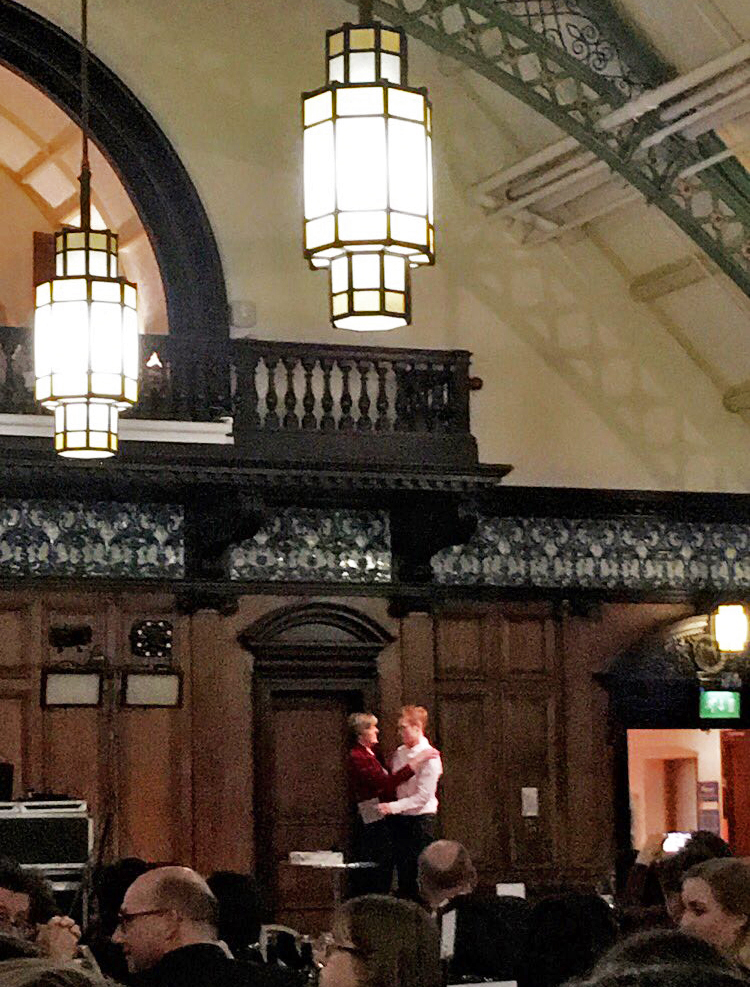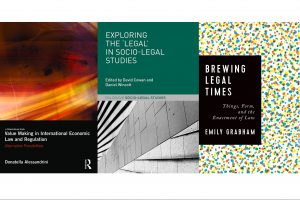Outstanding socio-legal scholarship at Kent Law School has been recognised by the Socio-Legal Studies Association (SLSA) with the award of two prizes – the Socio-Legal Article Prize to Professor Helen Carr and the Socio-Legal History and Theory Prize to Dr Emily Grabham.
The prize winners were announced last night at the SLSA’s Annual Conference dinner (held this year at Newcastle University). To add to the Law School’s success, Reader in Law Dr Donatella Alessandrini was runner-up for the Hart-Socio-Legal Book Prize. Earlier this year when announcing the shortlist, the SLSA confirmed it was unprecedented for the work of three academics from one institution to be recognised in this way.
Professor Carr was awarded the Socio-Legal Article Prize for her book chapter ‘Legal technology in an age of austerity: Documentation, “functional” incontinence and the problem of dignity’ (published in ‘Exploring the “Legal” in Socio-Legal Studies’ (Palgrave Macmillan), edited by Dave Cowan and Daniel Wincott.)
Professor Carr has research interests in housing, social welfare and public law and is interested in the regulation of the poor especially the homeless, the asylum seeker, the anti-social and those in need of care. She is currently completing a book on homelessness with Professor Caroline Hunter. Professor Carr teaches property law to undergraduate students at Kent Law School and is a Judge with the First Tier Tribunal (Property Chamber) where lessees can appeal against service charges, tenants can challenge rents and landlords can appeal against regulatory action taken against them by local authorities. Earlier this year, Professor Carr published a book chapter arguing that by understanding the caring relationships between homeless people and their pets we could reframe how we think about them. Published as ‘Caring at the Borders of the Human: Companion animals and the homeless’, the chapter was included in the book ReValuing Care: Cycles and Connections (Routledge).
Dr Grabham was awarded the Socio-Legal History and Theory Prize for her book ‘Brewing Legal Times: Things, Form and the Enactment of Law’ (University of Toronto Press). The book offers a fresh and lively examination of the relationship between law and time. It draws on perspectives from actor-network theory, feminist theory, and legal anthropology to consider how legal temporalities are ‘brewed’ in UK and Canadian Law. Case studies include debates about ‘progression’ and ‘likelihood’ in the context of HIV law, ‘work-life balance’ in labour law, and ‘transition’ in the context of transgender legal rights.
In addition to law and time, Dr Grabham‘s research areas include labour law, interdisciplinary perspectives on labour and value, and feminist legal theory. She is particularly interested in interdisciplinary approaches to legal analysis, drawing on methods and perspectives from legal anthropology, feminist theory, science and technology studies, and critical legal theory. Together with Dr Sian Beynon Jones from the University of York, Dr Grabham co-ordinates the interdisciplinary network Regulating Time: New Perspectives on Regulation, Law and Temporalities. Funded by the Arts and Humanities Research Council (AHRC), this network investigates how law and regulation are shaped by dominant concepts of time. Dr Grabham is also Deputy Head of Kent Law School and Co-Director of Research. (See Dr Grabham receiving her prize at the SLSA dinner.)
Dr Alessandrini was shortlisted for the Hart-Socio-Legal Book Prize for her book examining the contemporary production of economic value in today’s financial economies: Value-Making in International Economic Law and Regulation: Alternative Possibilities (Routledge). Dr Alessandrini has research interests in the areas of critical development studies, trade theory and practice, and feminist political economy. Her previous book Developing Countries and the Multilateral Trade Regime: The Failure and Promise of the WTO’s Development Mission (Hart, 2010) explores the way in which ‘development’ has functioned within the multilateral trade regime since de-colonisation.
Head of Kent Law School Professor Toni Williams said: ‘It is wonderful to see that a prestigious scholarly association such as the SLSA recognizes the original, rigorous and highly significant critical and socio-legal research that Kent Law School fosters and values. We are passionate about our research and are proud to be ranked 8th in the UK for research intensity according to the most recent Research Excellence Framework 2014. Our aim has always been, and continues to be, to produce theoretically informed work that makes a difference to society and to our students.’
Last year the SLSA awarded Kent Law School lecturer Dr Luis Eslava the Hart Socio-Legal Book Prize (and the Prize for Early Career Academics) for his book Local Space, Global Life: The Everyday Operation of International Law and Development. It was the fourth time that the Hart Socio-Legal Book Prize had been won by an academic from the School. Previous recipients of this prize have included: Senior Lecturer Dr Emilie Cloatre for her book Pills for the Poorest: An Exploration of TRIPS and Access to Medication in Sub-Saharan Africa (Palgrave Macmillan) in 2014; Senior Lecturer Dr Nicola Barker, for her book Not the Marrying Kind: A Feminist Critique of Same-Sex Marriage (Palgrave Macmillan) in 2013; and Professor Didi Herman for her book An Unfortunate Coincidence: Jews, Jewishness, and English Law (Oxford University Press) in 2012.
The SLSA, formed in 1990, aims ‘to advance education and learning and in particular to advance research, teaching and the dissemination of knowledge in the field of socio-legal studies.’ It achieves these aims primarily through meetings, conferences, and seminars; through research grants and prizes; through publications; through liaison with policy-makers and research funders; and through supporting students.


